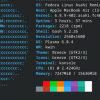Giving Linux a Lead Role at Home
One of the most significant benefits of Linux, I find, is system security.
I've watched, bemused, as one vicious worm after another has chewed its way hrough the Microsoft world. Each time another worm is unleashed, I pray that the Internet hasn't become such a Microsoft monoculture that it collapses under the onslaught. While Microsoft software has inherent security problems, its size also makes it a more inviting target. Virus- and worm-writing sociopaths focus on Microsoft systems, knowing they'll get more results from their efforts.
But if Linux gains a much larger share of the consumer desktop, who's to say it won't become more of a target?
In fact, I've already been hit a couple of times by worms that exploit Linux vulnerabilities.
As with Windows, new security holes turn up in Linux all the time. A large network of Linux security experts is constantly probing for security flaws, and writing fixes for these problems as quickly as possible when materialize.
Despite its improvements over the years, Linux remains, for now, mostly a geek's choice.









































































